#also 'sentient meat' as a tattoo or something would fuck
Text
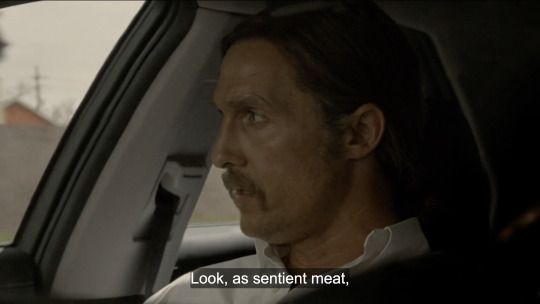
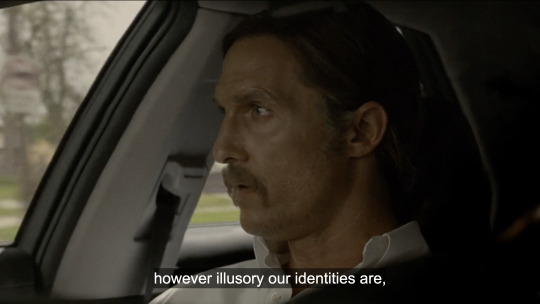

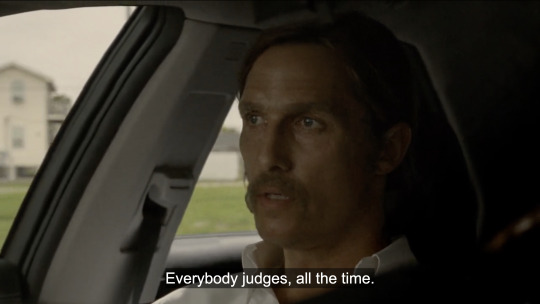
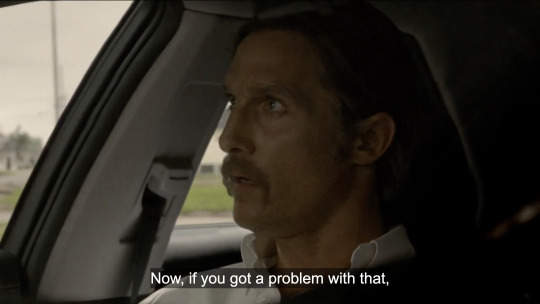
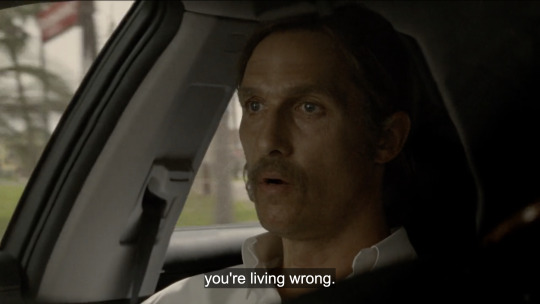


true detective 1x08
#true detective#i haven't laughed much watching/rewatching this season but the way he asks it is so funny#also 'sentient meat' as a tattoo or something would fuck#rustin cohle#marty hart
2K notes
·
View notes
Text
Book Review: THE ANIMALS IN THAT COUNTRY by Laura Jean McKay (2020)
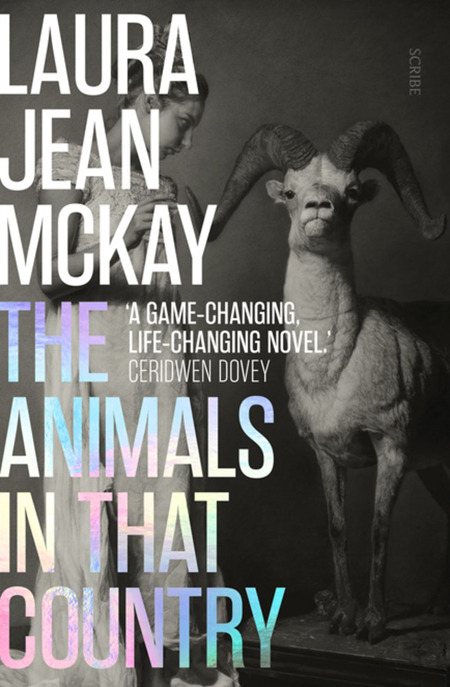
(Full disclosure: I received a free copy of this book in exchange for an honest review through Edelweiss and Library Thing's Early Reviewers program. Content warning for violence, including that against animals. Caution: this review contains a spoiler in the form of an excerpt.)
'Well, I’ve got a secret for you, Miss Kimberly Russo.'
She digs her sharp little nails into my skin. ‘What is it?’
‘This flu means people can talk to animals.’
Her head shoots up. ‘I want the flu, Granny. Don’t you?’
‘Grown-ups don’t wish they had diseases, and neither should you.’
‘But don’t you?’
Outside, Wallamina and Princess Pie are nose and beak to the sliding door, trying to press their way through. Eyes shining. ‘Course I bloody do.’
I can see the wild in her. She looks and acts like any dog. Plays, wags, stares into my eyes with her baby browns; does chasey, catch, begs for biscuits. Then the dusk comes and she lifts her neck and howls the saddest song in all the world, and there’s that wild. Dingo, owl, night thing — that sound is a warning. Loneliest you’ll hear. Wraps around your face, your sleep, your dreams. She’s saying:
‘Hey, hey. There’s something coming.’
The rangers here are always telling me, don’t talk like that. They say how dingoes are just establishing territory, checking on their pack. Dingo admin. But stand on the hot road that runs from the gift shop to the enclosures, and listen to the dingo in her cage call out to the packs on the other side of the fence. Tell me that’s not special. Tell me she doesn’t know something about the world that you and me haven’t ever thought of.
Jean Bennett isn't you're typical grandma - unless you're picturing Gemma Teller Morrow, that is. Jean drinks, smokes, swears, and sleeps around, usually all at the same time, and occasionally with her gay and committed coworker, Andy. She's got a tiger tattooed on her boob, and a dingo named Sue imprinted on her heart.
A lowly guide who dreams of becoming a ranger, Jean works at an Australian wildlife park, run by her son's ex-girlfriend Angela and owned by Angela's father. Jean and her husband Graham landed there years ago, after bouncing around the world for a while. Eventually Graham left Jean to shack up with another woman; their only child, Lee, jumped ship too, but not before hooking up with - and impregnating - Angela. Now Ange mostly keeps Jean around for the free child care (and maybe also because Ange feels sorry for her).
As for Jean, she stays stuck in this weird, awkward morass for her granddaughter Kimberley - one of the few people she can tolerate, let alone love. Jean prefers animals of the nonhuman variety, and the Park's residents/captives are her found family. She has a special place in her cockles for Sue, a dingo mix who she helped rescue as a wee little pup.
Jean's precarious life is already teetering on the edge of chaos when THE FLU arrives - first in southern Australia, then at the Park's gates, thanks to none other than an infected Lee, as charming as he is irresponsible.
Zoanthropathy (from Greek: zóo, “animal”, anthroponis, “human”, pathy, “disorder”), aka zooflu, otherwise known as "the talking animal disease," allow humans to understand and communicate with other animals:
'The strain known as zoanthropathy affects cognition in humans, and it is believed that enhanced communication between humans and nonhuman animals is possible. Zoanthropathy is hosted and spread by humans. [...] The disease is very high in morbidity and very low in mortality. Infected humans appear able to communicate (encode) and translate (decode) previously unrecognisable non-verbal communications via major senses such as sight, smell, taste, touch, and sound with nonhuman animals.'
When Lee runs off with Kimberley - to commune with the whales on the southern coast - Jean embarks on a cross-country road trip to find them. Riding shotgun is Sue, whose keen nose points the way to Tomorrow (Tomorrow being Sue's conceptualization of Kimberley. Jean is Yesterday, and Lee is Never There. Scathing, yet accurate.)
As with most potentially animal-friendly tales, I was equally nervous and excited to dive into THE ANIMALS IN THAT COUNTRY. As it is, the book both thrilled and disappointed me; I almost feel like it deserves two separate ratings, one for the idea and actualization of the dystopian zooflu future - which is breathtaking - and another for the human-centered plot that propels the audience's journey into this world - which is decidedly less so.
Let's start with the zooflu. It seems like it would be awesome to be able to talk to animals, right? Think again. I mean, really turn the idea over in your head, sit with the superpower, and try to envision what this might entail. Given that most of the nonhumans we encounter on the daily are exploited, oppressed, or otherwise negatively impacted by humans -
be it the 25 million farmed animals we create, torture, and kill for food every year in the US alone; the "wildlife" (read: free-living animals) we displace, starve, and kill through habitat loss; the dogs and cats we buy, neglect, and then abandon at shelters; or the animals we unintentionally hit with our cars (or the bugs we trod on just walking down the street); etc. x infinity
- we are weapons of mass destruction. To most of our nonhuman kin (and sometimes our fellow humans, too). Instead of words of wisdom and messages of hope, we'd be more likely to hear cries of terror. Confusion. Pain and agony. Hellfire, everywhere. Created and fueled by us and our own.
Heck, I'm not even sure it would be beneficial to always know exactly what our beloved, nonhuman family members are thinking. I have a fifteen-year-old dog named Finn who's going deaf and blind and battling dementia. More often than not, I suspect that being privy to his innermost thoughts would freak me the fuck out. Not to mention break my damn heart.
And then there's the mode of communication: not just just verbal, as we're used to, but all-encompassing: "sight, smell, taste, touch, and sound." Think pheromones, sound waves, scratches and ticks. The beating of countless tiny wings, all bombarding your brain and trying to tell you something. That kind of thing, coming at you uninvited and from all directions, is apt to drive a person mad. And it does, as evidenced by zooflu sufferers who stuff their orifices with whatever's handy to block incoming stimuli - or, at the more extreme end, the pseudo-religious trepanners who invite strangers to drill holes in their skulls in a misguided attempt to relieve the pressure.
Talking to animals sounds like the stuff of dreams - but in McKay's hands, it's a nightmare.
And a pretty trippy one, at that: fittingly, the incoming messages that Jean's left to decode aren't quite what you'd call straightforward. There's a lot of translation required, and Google hasn't yet caught up:
I’m reading her body like some language I barely remember from a high school textbook. Bonjour madame, connaissez-vous le chemin de la gare? Let’s go to the station. Or, where the hell is the supermarket? I can parrot the words, but the meaning is in scraps.
Copies of this book should be sold with a sheet of acid, or maybe some edibles. I kid, but also not.
If, like me, you assumed that increased understanding and compassion would surely spring forth from this newfound ability to communicate with nonhuman animals, you'd be wrong. While some people do indeed embrace the flu, many others lash out: animal-free zones are established, and hungry citizens start hunting former pets, since they make for easy prey (apparently they've never heard of fruits and veggies?).
There's one especially excruciating scene that I don't think I'll ever be able to forget. Jean takes refuge in a makeshift church, only to catch a glimpse of how the missionaries make their sausage (stew):
A small fluffy dog has pelted out a kitchen door, thin bit of twine tangled around its legs, body blonde fire, screaming,
Hello. Please.
Please bite its soft.
Quick.
Help
me.
I jump up, calling the poor little bugger, but the parishioners shriek louder, climbing on their chairs like that dog is the snake from the garden of Eden. The woman rushes for her daughter and hauls her by an arm out of the room. It’s funny, for a second, until the laugh dies in my throat. The little dog, too tangled in the twine to move, slumps panting in the aisle.
It’s not just m
e. Where’s other
me. She’s
still —
The god-botherers are faster than me. They grab that dog with WWF wrestling passion, using real lumps of wood, real knives. The little dog has enough time to issue a thick whiff of terror from its undercarriage,
Help
her,
before they’ve slit it ear to ear right there in the pulpit. There was no blood with Lee. He didn’t even look that drowned. He might have come alive any moment. He might be alive right now in his grave. This little dog, though, is bleeding out on the beige carpet. The door to the kitchen is open. Matthew the soup cook leans on the jamb, then turns back. A fluffy tail on a chopping board. The steaming pots. Pain like a stab to my guts — he stirs a soup very much like the one he was serving up in the park.
Of course, this scene is so repulsive to most of us - Jean included - only because the animal being killed and consumed is designated for "companionship" instead of "food," at least in this particular culture. Chances are you've known and loved a dog or two yourself - and so the doomed beast transforms from a something to a someone. Not an unfeeling object to be used and discarded at will, but a sentient creature with her own feelings, desires, and loved ones. Had it been a chicken or pig, the result wouldn't be quite so horrifying; Jean herself eats meat, and justifies doing so, on several occasions.
Yet an earlier scene - in which Jean comes upon an abandoned tractor trailer truck packed with pigs destined for slaughter - will hopefully challenge readers to expand their circle of compassion:
I’ve seen battery hogs before — of course I have. But not out and about. Not staggering around and trying to walk, calling to whatever they think is ‘more’. Glazed eyes that strain like they’ve never seen sunlight. Skin stretched over bodies fed to the point of bursting — something between swine and meat. Saw some animal liberationists on the street in the city one time, saying factory farms were the same as Nazi camps. I called them bloody racists too. The pigs clatter past me down the ramp, fucked-up eyes on the road ahead, calling,
Hello
is it more.
Those animal nutters were wrong, but not in the way I thought. It’s not the same as the Nazis: that was us doing to us. What’s this? [...]
A hurt sow sits on her haunches, then lies down on the verge, panting unevenly under the slathering sun. Another weaves blindly over the asphalt toward her, flies spinning around her head. They push their noses into each other.
Send me
a postcard,
the sick one says.
Postcard, indeed. What the fuck. I watch more closely. The meaning bright off that tight skin. All the little bits saying,
Leave me,
and,
I’ll hear about it,
and,
Don’t you see
it. Move on. There’s
more.
The ones that can walk stretch their legs, for,
More,
more, more.
I stand at the top of the truck ramp watching them break into a group trot toward the next paddock. Skin rippling. Hooves carolling. Know that heart-in-your-mouth run. Know exactly what ‘more’ is. I’ve seen it in Lee and I’ve had it too, at times. These pigs are half dead, they’re stumbling around, blind, mad, and fucking hopeful.
Even if many of the characters in this book resist the humanity clearly evident in nonhuman animals, I hope that readers will hold these passages close - especially at the dinner table.
Sue, our main nonhuman protagonist, is a fascinating character; like many of the semi-domesticated animals in the park, McKay paints her as a series of conflicting impulses: safety or freedom. Hunger or satiation. Dingoes or humans. She is fiercely loyal, much to her own detriment. She has wants and needs of her own, and she's often satisfied to set them aside for the good of her (adopted) pack.
And I guess that brings me to the second half of this review: the humans, most of whom are awful. Jean, exponentially so.
Initially I thought that Jean would be my people: she's a hard-drinking, mold-breaking badass broad who gets on better with animals than people. She has a mini-rescue in her backyard where she keeps some of the park's doomed relinquishments. (The public treats the park like a rehab facility when in fact it's in the business of entertainment - old, sick, injured, and "common" animals are routinely killed.) She and Kimberley spend their afternoons together designing the animal rescue they hope to build one day.
But Jean is kind of a terrible person. To call her a misanthrope is half the story: she's also senselessly mean and cruel, especially when drunk, hungover, or frustrated (in other words, 90% of the time). I don't fault Jean for her substance abuse problem - alcoholism is a mental health issue and should be treated as such - but nor is it an excuse for being such an asshole. (There's even a scene where she trolls people discussing the zooflu online, like a fucking American redhat.) She's shit to everyone around her, except for Kimberley and Lee (Lee, who could use a good ass-kicking).
And then there's Sue: Sue, who followed Jean across the damn country when she should have been settling into a dingo pack of her own. Sue, who found Kimberley and saved Jean's life. Sue, who is nothing but good and true and trustworthy. Sue, who Jean assaults on multiple occasions: kicking her in the ribs, binding her with rope to prevent her escape, and even trying to shoot her (with a gun that's thankfully empty of bullets). At one point, she "forgives" Sue for saving her life - as if Sue's the one who needs forgiveness!
Despite the abuse, Sue continues to stick by Jean's side, which galled me endlessly. Towards the end of the story, following the attempted murder, Sue gets revenge of a sort, dominating a delirious Jean and forcing her subservience. However, the book ends shortly thereafter, cutting any sense of satisfaction far too short.
I really felt cheated with Jean: I thought she might be my avatar in this world - but she's just another terrible human who doesn't deserve the company of animals.
Likewise, the whole subplot involving Kimberley's parentage is way over the top dramatic and unnecessary; it seemed like we were being plucked from a dystopia and dropped into a soap opera for a minute there. Just, gross.
So yeah, there are definitely some aspects of the book that I appreciated more than others. THE ANIMALS IN THAT COUNTRY may be imperfect - but I'd still wholeheartedly recommend it to anyone looking to explore our relationship to nonhuman animals in a dystopian setting.
#books#reviews#book reviews#fiction#science fiction#dystopia#nonhuman animals#Laura Jean McKay#the animals in that country
2 notes
·
View notes
Text
Gavin Reed + Anarchy Influence
“#BodyBag - I saw the body drop on the six o’clock--”
So, my Gavin is a very particular breed of asshole, and if you look at the tattoos he has, it’s a pretty big pointer towards an anarchy based ideal as far as his inner world is concerned.
I.E. -
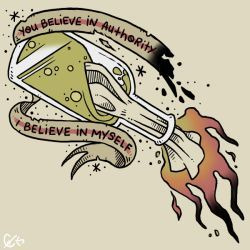
Gavin’s a pompous motherfucker, but he also has a strong sense of what he does and doesn’t believe in. Morality is a HUGE grey area for him, he is very much a man who would turn a blind eye to vigilante justice because at least Someone was doing what needed to be done out there.
He sees the world in a very black and white way, and yet he doesn’t at the same time. There are obvious points of right and wrong, but where the line begins to blur is where self imposed justice comes to mind. ( Gavin, in his disgust and disinterest, writing off the murder in the Eden Club because this fucker most likely had it coming, doing whatever he was doing. Not worth the time. And guess what? Damn if he wasn’t somehow right in the end, and boy would that make him smug even if he despises the bots it essentially helped. )
He can look at a situation, and if he thinks personally that it’s passable, he won’t say a word. That being said, he still does his job, but he’s very much of the opinion that ‘If you did something fucked up you should rot in hell.’ It’s ruthless, and it can be a bit gross with what he believes is right or wrong ( I.E. android abuse vs human abuse ) but he is genuinely not an evil person. He feels as if the government and even cops like himself are incapable of doing what needs to be done most times. If it finally comes down to it? And another scumbag leaves the world? Good.
That being said, Gavin despises the government, celebrities, media and especially the president herself. He thinks that they’re all useless clutch items that only fuck everything up even worse than it was to begin with. Gavin is a humanist. ( Humanism - an outlook or system of thought attaching prime importance to human rather than divine or supernatural matters. Humanist beliefs stress the potential value and goodness of human beings, emphasize common human needs, and seek solely rational ways of solving human problems. ) As far as he’s concerned, a majority of the governments actions + the medias integration and exploitation of situations creates a meat grinder effect.
His humanist ideals also effect his views of Kamski. He fucking despises the guy for essentially creating semi-sentient beings with a murder button. They’re all a bunch of people ‘in power’ with no idea what they’re doing. He grew up with no trust for authority, and he’s become an adult with no trust for authority. The empty ideals, the use of the people, it disgusts him which is why he turns to smaller things to return some sort of structure to what he’s seen torn away. ( I.E. The youth center... )
There’s nothing that also disgusts him more than someone prioritizing an android over a human. He has a very borderline anarchist view point on authority and yet the last thing he wants to see is a dystopia, which he feels is an inevitable outcome if these robots are permitted to not only live like humans, but become prioritized when they’re just coding that can be backed up onto a disc, immortal creations of man, which can surpass it’s creator in just a few steps. All they need to do is perform a task that already strains a humans constraints, and that’s it.
Androids will replace humanity, bit by bit, and they’ll all become extinct.
Gavin is sick of the lies.
Gavin is sick of finding people dead for the sake of a glorified smart phone with a human face.
Gavin is sick of the silent acceptance of the world around him
He wants to see a change, he was meant to BE a change but he can’t get out of his own way to begin with. He can hardly see around his own ego and when his empathy jars it’s even worse but god DAMN if he doesn’t try and god damn if he doesn’t make sure others know the way he feels about their misguided ( in his opinion ) decisions. The only person who he trusts to make these decisions are himself.
He’s also tired of losing people only for it to be a press field day, because a crime scene shouldn’t be a reality show.
Maybe he’ll move to Freetown Christiana instead.
Songs that fit his view to a fucking T as well as probably a lot of other DBH Character’s views ( Lyrics are sensitive and deal with politics, school shootings, terrorism, media abuse, etc ) :
Thoughts & Prayers ; 6:00 ; Stick Up
Lost his old occupation
But it wasn't immigration
It was a machine, automation that replaced him
Politicians left him, corruption since the recession
#『ah shit my cactus died』▶ ooc#『You don't know whats in my head』▶ headcanons#wow this fels hella intense and im p sure i left out a lot but yanno
5 notes
·
View notes